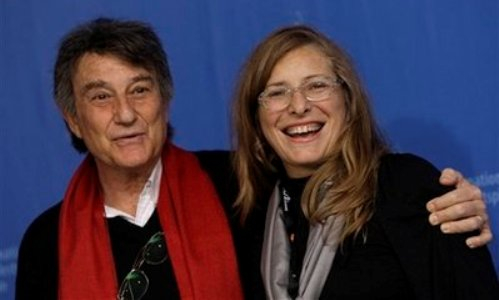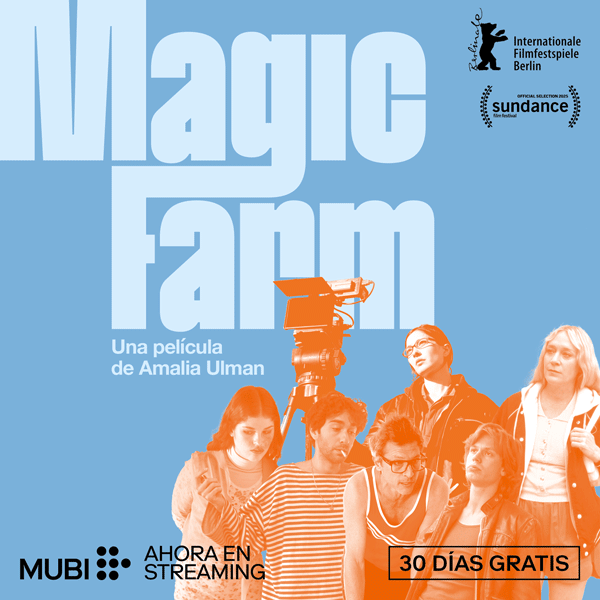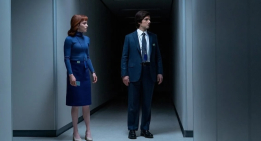Noticias
Berlín 2010: Las críticas de Rompecabezas
A continuación, algunas de las reseñas que se publicaron luego de la presentación de la opera prima de Natalia Smirnoff en la competencia oficial del festival.
"Justo delante del extraño edificio mutante, y muy pop, que responde al nombre de Tempodrom (una sala de conciertos con aspecto de nave espacial) se alza la Anhalter Bahnhof. Lo que queda de ella. Apenas un trozo de su majestuosa y muy bombardeada fachada. Como si se tratara de una pieza de un extraño puzzle, la antes imponente estación de ferrocarril ahora no es más que un trozo de algo aún mayor: la historia entera de Alemania. Y claro, el turista, de por sí impresionable, no tiene más remedio que dejarse impresionar.
Quizá este sea el secreto de los rompezabezas, dejar entrever en una pieza, ridícula e informe, todo el resto. Anunciar el océano en una gota. Cosas de las metonimias arriesgadas: el todo por la más pequeña de las partes. Borges se imaginaba la historia de la literatura, de todas las literaturas posibles, en una sola palabra. Pues bien, quizá por compartir nacionalidad con el escritor de 'El libro de arena', la directora Natalia Smirnoff presentaba este jueves su propia interpretación del, llamémosle así, 'enigma tempodrom' (qué bien suena).
Rompecabezas es el nombre su película. Y, adelántese el resultado, brillante. La cinta cuenta la historia de una obsesión. Una mujer (interpretada por María Onetto, la mejor actriz en muchos kilómetros a la redonda) descubre un buen día la pasión que dominará el resto de sus días: montar puzzles. Con este sencillo arranque, la realizadora debutante compone el retrato perfecto y preciso de una vida que, de repente, se descubre a sí misma. Un instante de lucidez basta para componer el sol entero.
Con precisión, la cámara se desliza por la superficie del propio puzzle en el que se convierte la película. El espectador es invitado a imaginarse, desde cada pedazo de celuloide, la existencia entera de la mujer protagonista y, ya de paso, de cualquiera de ellas. Sorprende la coherencia, la imaginación y, por encima de todo, arrebata la mirada arrebatada de Onetto (¿hemos dicho ya lo buena actriz que es?).
Lejos del relato, la tentación del subrayado, ni rastro del siempre socorrido recurso de la metáfora cargante. Cuanto daño ha hecho la metáfora a la literatura. Como la propia historia de la mujer, la película se recompone, se descubre, al espectador a medida que avanza. Para películas así existe el adjetivo moderno. La cinta es en todo momento consciente del mecanismo narrativo que la anima. Modernidad, o simplemente honestidad; honestidad narrativa. La sinceridad, ya se sabe, requiere de la inteligencia y del sentido del humor del que escucha. Se agradece tanta consideración."
La pieza clave de un rompecabezas argentino, por E.
Rodríguez Marchante (diario ABC de Madrid)
"Casi
todo el cine que había programado la sección oficial se ha ido ya por el
desagüe, y todavía no se ha visto en la competición esa película imbatible que
luego, el jurado, nunca elige. Quedan tan sólo dos o tres por salir y hay que ir
ya tomando posiciones y afilando pronósticos, por eso la interpretación de María
Onetto, la actriz protagonista de la película argentina
Rompecabezas, sólo puede ser dos cosas: o la gran premiada o la
gran olvidada. Con una precisión milimétrica, Onetto nos dibuja en la pantalla
el mapa emocional de una mujer llena y vacía, junto a su familia, que la adora
mientras mira a través de ella, y con una obsesión reciente: hacer puzzles. La
directora, Natalia Smirnoff ama a su amable personaje, pero también a sus
circunstancias, buenas y malas, logradas y malogradas, y nos lo ofrece todo con
mucha sensibilidad y miramiento. Y junto a María Onetto, Arturo Goetz consigue
también un finísimo dibujo de un hombre anfibio, raro, que es una cosa pero
podría ser con un ligero toque de cámara justo la contraria."
Crítica de Variety, por Jay Weissberg
After a decade
as assistant director and casting director for the likes of Pablo Trapero and
Lucrecia Martel, Natalia Smirnoff settles into the director's chair with her
delicate feature debut, "Puzzle." A detail-oriented look at a housewife quietly
asserting her independence through a puzzle tournament, this femme-skewed
chamber piece is a low-key charmer for auds open to its honest subtleties,
boosted in no small part by Maria Onetto's beautifully modulated performance.
The pic's Berlin competish slot should spur moderate Euro sales, though critical
support will be necessary if other pieces are to fall into place.
The
opening segment perfectly captures the situation at home for Maria del Carmen
(Onetto): We see closeups of a meal being made as she prepares for a large
party, during which she serves the guests, takes veiled barbs from her
mother-in-law and then brings out a cake featuring a big "50" in candles. Only
then do auds realize it's her own birthday. After cleaning up (unassisted, of
course), she looks at her presents and starts doing a puzzle.
Maria del
Carmen has reached a difficult moment: Her husband, Juan (Gabriel Goity), has
his business and is eminently satisfied with his wife's status as a loving
drudge at home, while her two kids, Ivan (Julien Doregger) and Juan Pablo
(Felipe Villanueva), are reaching the age where they're moving out or otherwise
preoccupied with their lives. Lacking any interests outside the home, Maria del
Carmen needs a purpose again, or at least a passion.
Her first puzzle
sparks an interest, and at a shop, she sees a flier from someone looking for a
puzzle tournament partner. Without letting her family know, she meets rich
bachelor Roberto (Arturo Goetz), who's struck by her unorthodox but rapid
puzzle-solving skills, and this old hand at competitions agrees to take her into
training. In the coming weeks, Maria del Carmen tells her family she's looking
after a sick aunt -- while she and Roberto do puzzles together at his mansion,
where he opens her up to outside interests.
While story-driven, the pic
knows it's a slip of a tale, and Smirnoff's success comes in the way she fills
in her characters, signaling the dynamics at home in a clear but understated
way. Maria del Carmen is taken for granted by her kids, and it's ultimately
difficult to decide whether Juan really loves his wife or just likes the comfort
of knowing there's a warm, devoted and willing body next to him in
bed.
If Maria del Carmen is on a different wavelength from her husband
and kids, the same goes for her relationship with the sophisticated Roberto. The
point is, she doesn't truly fit in either world, at least not until she's able
to assert a modicum of independence at home and find the happiness in herself
that's been lacking. Considering how close Smirnoff keeps the camera on her
protag's face, registering Onetto's every shifting feature, it's clear the
helmer had absolute, and justifiable, trust in the thesp's ability to get inside
her character. Without overdoing the mousiness, Onetto (who starred in Martel's
"The Headless Woman") combines an unsophisticated fragility with a strong core,
and when she gets what she wants, there's a radiance in her smile that fills the
screen.
For the most part, Maria del Carmen's world is shot with
diffused, pale tonalities, matching the pallid colors of her clothes and skin.
Roberto's home appears slightly warmer, increasing the sense of escape into
something comforting and rare. Ace d.p. Barbara Alvarez ("Whisky," "The Headless
Woman") at times overdoes the shaky lensing, though it's nothing out of the
ordinary in this obsessively handheld age. Auds will be divided over whether the
odd mouth-harp music detracts from or enhances the proceedings.
Crítica de Screen International, por Jonathan
Romney
A middle-aged housewife finds a new lease of life through
discovering her skills at jigsaw puzzles. That may sound like a weekday
afternoon TV movie, and although Argentinian domestic drama Puzzle is slightly
more distinguished than that, it’s not hard to drift off while watching it and
imagine who you’d cast in the remake: Julie Walters, perhaps, with Bill Nighy as
her suave jigsaw mentor.
A debut from Natalia Smirnoff, former AD to
Pablo Trapero and casting director for Lucrecia Martel, Puzzle is a slender,
unremarkable piece of feminist affirmation that represents no stretch for lead
Maria Onetto. Mundane execution and mainstream approach should make it a low
priority even for distributors committed to new Argentinian cinema.
The
film lays its cards on the table at the start, showing Buenos Aires housewife
Maria del Carmen (Onetto) slaving to prepare a birthday party – which turns out
to be her own 50th. Her husband Juan (Goity) and two teenage sons are devoted,
but they take Maria for granted and let her do all the work around the house,
which she endures with long-suffering calm.
Then she discovers jigsaw
puzzles, and when she finds an advert for a partner in a tournament, she’s game.
Apparently an unschooled natural, she’s taken up by elderly, dashing and moneyed
Roberto (Goetz), who shows her the ropes of the jigsaw world. As Carmen spends
more time shuffling around little bits of cardboard, her family starts to fend
for itself, the men even learning to cook. Before long, Maria is on the way to
her first jigsaw trophy, with an impressed Roberto even getting, well, jiggy
with her.
And, apart from a lightly bittersweet ending, that is just
about it. If we were expecting Maria’s hobby to become a morbid obsession with
disturbing repercussions for her family, Puzzle certainly doesn’t go there. Nor
does Smirnoff particularly develop the metaphor of Maria reconstructing the
scattered order of her life: no, this is quite simply a film about a woman who
likes doing jigsaws. The characters are thin, but generally likeable: even Juan,
for all his machismo, is a loving husband, played by affable blokeish charm by
Goity, and there’s some relaxed ensemble acting, apparently improvised, within
Maria’s household.
But we learn next to nothing about Roberto, except
that he knows a bit about Egyptian history, and it’s hard to credit any erotic
spark between Maria and this dry, patrician townie. As for the humorous domestic
moments – Juan confesses a propensity for tai ch’i, Maria’s younger son embraces
vegetarian cooking - it’s all designed to elicit the lightest
chuckle.
Onetto sensitively downplays the harried, hesitant Maria, but
hardly gets the scope to shine as she did in The Headless Woman. Barbara
Alvarez’s photography is warm-hued but muted, establishing a tone of low-key
kitchen-sink naturalism. The film’s most distinctive touches are its
incongruously hippie-ish percussion and flute score, together with a great deal
of what looks suspiciously like product placement for jigsaw manufacturers
Ravensburger.
Crítica de El País de Madrid, por Carlos
Boyero
Rompecabezas es la ópera prima de la directora argentina Natalia
Smirnoff. Durante los 10 primeros minutos que recrean con morosidad militante
una fiesta de cumpleaños en la casa familiar, tengo la sensación de que el
estilo y el psicologismo de la autora se han propuesto imitar la cansina
expresividad y el retorcido universo de la tan prestigiosa como para mí temible
Lucrecia Martel. Los diálogos costumbristas de una aparentemente feliz ama de
casa, su cariñoso marido y dos hijos esforzadamente naturales aunque
decididamente insoportables, parecen recitados al azar, con falsa cotidianeidad.
Resulta que esta sacrificada y modélica esposa descubre casualmente que tiene un
arte especial para construir puzzles. Su enganche con ellos derivará en
que la discreta y eficiente casada mienta a su familia, descuide sus labores e
incluso llegue al adulterio. Cosas que ocurren cuando las repentinas adicciones
te hacen descubrir tu verdadera naturaleza. Se supone que todo en esta película
pretende ser sugerente, penetrante, contradictorio y complejo tras su fachada
minimalista. Por mi parte, a ratos me intriga la personalidad de la
protagonista, y en otros no puedo reprimir el bostezo.
COMENTARIOS
-
SIN COMENTARIOS
DEJÁ TU COMENTARIO



NOTICIAS ANTERIORES
Del 19 de julio al 3 de agosto se proyectan en el Cine York (Juan Bautista Alberdi 895, Olivos), con entrada libre (por orden de llegada), films como El aura, Nueve Reinas, Un Oso Rojo, Silvia Prieto, Pizza, birra, faso, El estudiante, Rojo, Cuando acecha la maldad, Simón de la montaña y Alemania.
Del 23 al 27 de julio se proyectarán, entre otras películas, Sauvages y My Life as a Zucchini, de Claude Barras; L'Histoire de Monsieur Vieux, clásico de animación con musicalización en vivo a cargo de Axel Krygier.
El responsable de la muestra ¡Esto es Historieta! adelanta lo mejor de la inminente segunda edición, habla de las relaciones entre cómic y películas, de los tributos a Héctor Germán Oesterheld y Fabián "Polo" Polosecki; del fenómeno de Hora Cero y la nueva cinefilia, de su traumática salida como director artístico del Festival de Mar del Plata en 2024, de la movida de Contracampo (ahora Fuera de Campo) y de la situación actual en el INCAA en particular y en el cine argentino en general.
-Severance sumó 27 candidaturas, seguida por El Pingüino con 24, The Studio con 23 y The White Lotus también con 23.
-HBO Max consiguió 142 nominaciones seguida por Netflix con 121 y Apple TV+ con 81.
-La ceremonia de la 77ª edición será el domingo 14 de septiembre con la conducción de Nate Bargatze.











